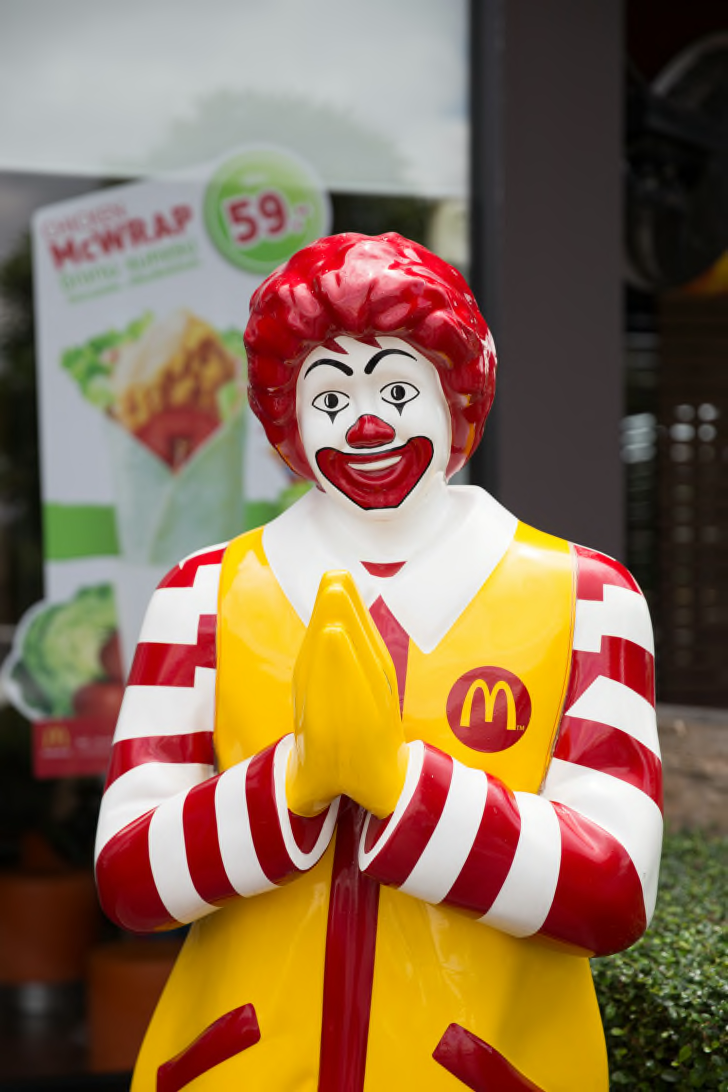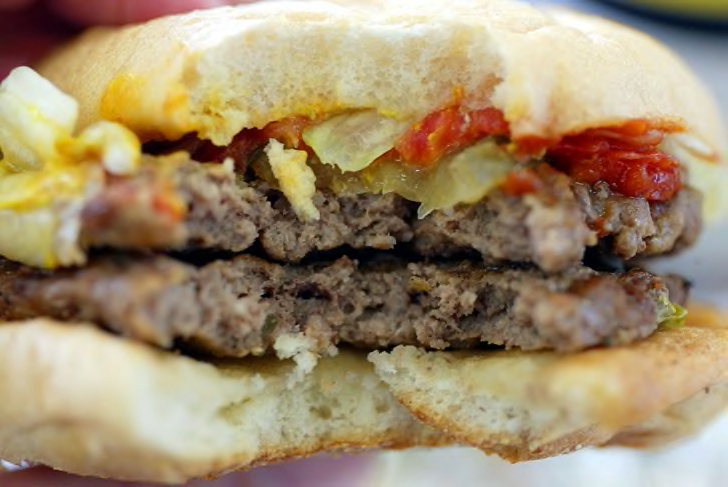7 Bizarre Lawsuits Involving McDonald's
Since the 1950s, McDonald’s has been serving up a menu full of convenient, fast-service food, from their signature Big Mac to the portable Chicken McNugget. Unfortunately, not everyone has been happy with their Happy Meals. The company has occasionally found itself embroiled in complaints from customers who have been dissatisfied and requested a side order of litigation. Take a look at some of the legal cases tossed around the Golden Arches over the years.
1. McDonald’s v. Ronald McDonald

PhonlamaiPhoto/iStock via Getty Images
The ability for McDonald’s to find itself in the middle of legal quandaries was demonstrated early on. After being in business for 14 years, the independently-owned McDonald’s Family Restaurant in Fairbury, Illinois, was issued a legal notice from the McDonald’s corporation in 1970 warning them to avoid using any arches or offering drive-in service. The letters continued for decades, with owner Ronald McDonald (yes, that is his real name) paying little attention. It was, after all, his family’s name and restaurant. But McDonald’s upped the ante in 1992, when a local franchisee finally opened a mile down the road, and a flurry of activity commenced. McDonald (the person) eventually settled, and the two locations became known to locals as McDonald’s East and McDonald’s West. The agreement also required Ron to take the possessive “S” off the family restaurant name, but it went back up in 1996, when the franchise location closed.
2. The Quarter Pounder Controversy
The McDonald’s Quarter Pounder seemingly leaves little to the imagination. It promises one quarter-pound of meat, which it delivers. (You can also opt for the Double Quarter Pounder, which gets you closer to an entire cow.) It also comes with cheese, which caused some strife at a South Florida location in 2018. Two customers, Cynthia Kissner and Leonard Werner, filed a $5 million class action lawsuit in Fort Lauderdale because the restaurant charged them the full price of a Quarter Pounder despite their request for employees to hold the cheese. The plaintiffs argued that the McDonald’s app offered a Quarter Pounder without cheese for roughly 30 cents less and that they should not have been charged more when they asked to hold the cheese. Not all locations, however, offer that option, and the argument that the cheese and no-cheese burgers are somehow one product was not convincing to the judge. As the customers were unable to prove damages, the case was thrown out of court.
3. H.R. Pufnstuf Invades McDonaldland

John M. Heller/Getty Images
McDonaldland, that child oasis found in many McDonald’s commercials of the 1970s and featuring a variety of characters from the Hamburglar to Grimace, was once the subject of a legal struggle. Sid and Marty Krofft, producers of the psychedelic kid’s series H.R. Pufnstuf, sued McDonald’s alleging that Mayor McCheese was copied from its own political abomination, Pufnstuf. (Both have enormous heads, and Pufnstuf was mayor of Living Island.) The Kroffts claimed that Needham, Harper & Steers, the ad agency responsible for McDonaldland, consulted with them before breaking ties and producing the commercials on their own. The courts ruled in favor of the Kroffts in 1977, declaring the ads took the “total concept and feel” of the Kroffts’ show. McDonald’s was ordered to pay $1 million and had to stop airing the ads.
4. The contaminated Coca-Cola
In 2016, Trevor Walker ordered a Diet Coke from a Mickey D's in Riverton, Utah. While lower in calories, it was apparently higher in illegal substances. The drink was somehow contaminated with Suboxone, a heroin substitute. Walker temporarily lost feeling in his arms and legs and had to be taken to the emergency room of a local hospital. Walker sued, but McDonald’s argued they should be dropped from the lawsuit owing to the fact that they are removed from the day-to-day operations of franchised locations. (A manager and employee were suspected of spiking the drink, but security footage was unavailable to confirm the theory.) Third District Court Judge James Gardner was unmoved, saying McDonald’s couldn’t be that separated if they also mandated franchise managers attend Hamburger University for training—or “this hamburger school,” as Gardner put it. The case is ongoing.
5. Big Macs and brothels
In 2012, former McDonald’s employee Shelley Lynn sued McDonald’s and made the audacious claim that the company’s low wages had forced her into a side job as a prostitute for a Nevada brothel. Lynn was hired for a position at an Arroyo Grande, California, McDonald's location, where she alleged manager Keith Handley pushed her into a life of sex work. Lynn complained there was no practical grievance system in place and that Handley should not have been sold a franchise. A United States District Court judge in California found in favor of McDonald’s and Handley that same year.
6. McDonald's In a Pickle

In 1999, Veronica Martin and her husband ordered hamburgers from a McDonald’s in Knoxville, Tennessee. What should have been a delicious treat turned ugly as—according to Martin—a very hot pickle shot out from between the bun, landed on her chin, and scalded her, leaving her with second-degree burns. A lawsuit followed, with Martin arguing the pickle was “defective.” She sought $110,000 while her husband asked for $15,000 for losing the “service and consortium” of his wife. The two parties settled in 2001, though McDonald’s maintained no monetary payment was offered.
7. a Weighty Problem
It can be assured that excess consumption of calories, whether they come from McDonald’s or other sources, will result in an accumulation of fatty tissue. This did not prevent several overweight teenagers in New York from taking McDonald’s to court in 2002 in an attempt to place responsibility for their habit of eating at McDonald’s several times a week at the feet of the corporation. The plaintiffs, Ashley Pelman, 14, and Jazlyn Bradley, 19, among others, said they did not know how fattening the food was and complained of high blood pressure and high cholesterol, among other ailments. One plaintiff, a 600-pound 15-year-old, said he ate there every day. Lawyers argued advertising to children helped foster a trust of the food’s nutritional value.
The case was rejected by a judge in 2003. Now at least 26 states have “common sense consumption” laws, which prevent lawsuits from being filed against food manufacturers for adverse health effects as a result of gorging on a decadent diet. It's also known as the "cheeseburger law."